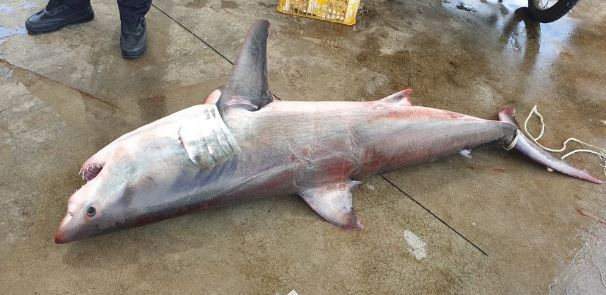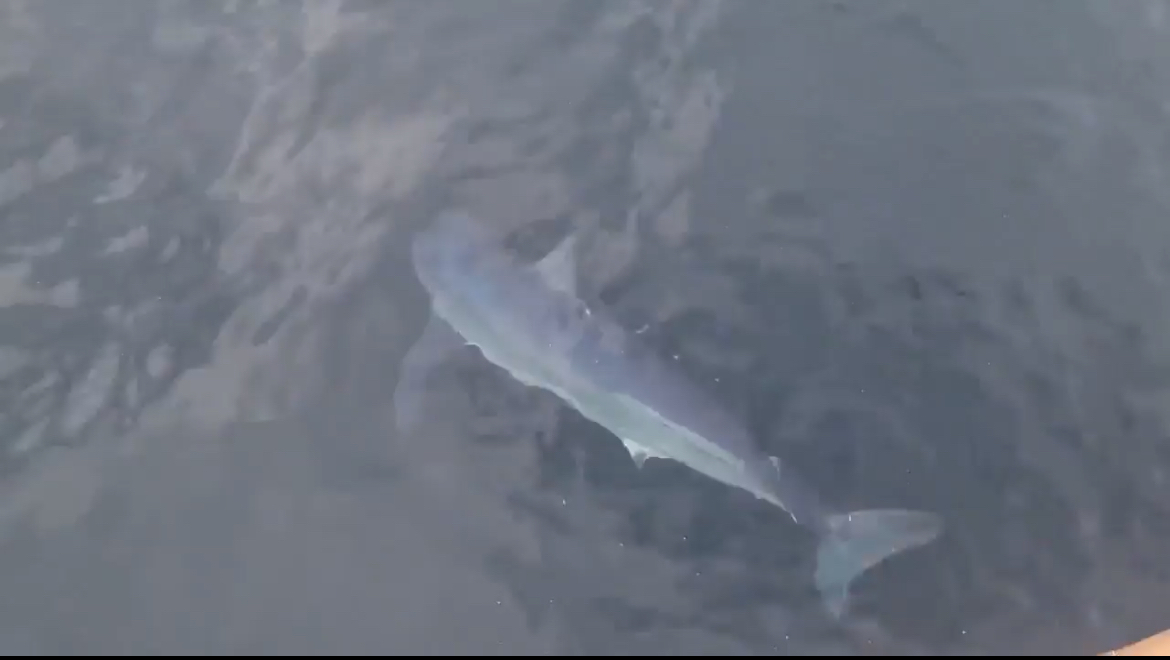Growing shark encounters put east coast on alert ahead of vacation season
More shark encounters in the East Sea is a sign of global warming, experts say
By Jung Min-kyungPublished : July 12, 2023 - 14:29

Shark sightings in South Korea have long been limited to the realm of movies like Steven Spielberg's iconic 1975 film, "Jaws." Being a relatively shark-free zone, encountering dangerous sharks was considered more fiction than reality.
But recently, a growing number of sightings of shark that are known to attack humans in the East Sea indicate that Koreans are no longer safe from the predatory creatures.
Shark scare
On the night of July 8, a fishing boat floating off the coast of the country's southeastern port city of Pohang spotted a shark some three meters long swimming by.
The captain of the ship took a photo of the animal and reported it to the authorities.
Confirming the creature to be a mako shark -- known as a swift, active and potentially dangerous species -- the Korea Coast Guard called on fishers and beachgoers to take extra caution.
"(The latest sighting follows) the discovery of a dead salmon shark in a fishing net off the coast of Samcheok, Gangwon Province on July 6," an official said.
"On July 7, the coast guard spotted what is presumed to be a mako shark off the coast of Samcheok (prior to the July 8 sighting)."
The July 8 sighting marked the 10th sighting of a shark known to attack humans this year. Nine of the 10 sharks were spotted in the East Sea area. Two were great white sharks, which are considered extremely rare in the area.
To prevent potential shark attacks, the city of Sokcho recently installed a 600-meter-long safety net across the water near its beaches. It marks the first time such a net was installed for the purpose of blocking sharks at a beach near the East Sea.
However, so far there have only been sightings, with no attacks on swimmers or divers reported this year.
Popular beach towns along the East Sea coastline including those in Gangneung and Busan thrived for decades as safe, family-friendly environments.

So far, Korea has seen only seven shark bite incidents since 1959, according to government data. All attacks were all carried out in the nation's western coastline near the Yellow Sea. Of the seven victims, six died and one survived. Most of the victims were divers and haenyeo -- female divers in Korea whose livelihood consists of harvesting a variety of seafood without oxygen tanks.
Rising ocean temperatures
The rise in the temperature of the East Sea due to global warming is a key reason behind the surge in the number of shark sightings, according to experts.
"With the water temperature in the East Sea rising due to global warming, some types of sharks that usually inhabit warmer waters are expanding their territory," said Choi Yoon, a marine biology professor at Kunsan National University.
"Of the sharks known to attack humans, great white sharks have a strong tendency to attack people and swim close to land, which calls for extreme caution," Choi added.
In the past 50 years, the ocean temperature around the Korean Peninsula has risen 1.35 degrees, some 2.5 times the average temperature increase of other seas around the world.
From March to May this year, the East Sea saw a record rise in ocean temperature over the period, according to latest data from the state-affiliated Korea Institute of Ocean Science & Technology (KIOST). It rose 10 degrees this year during the cited period, marking the highest gain since the think tank started compiling the data in 1981.

During the same three-month period in 2021, the temperature of the East Sea rose 9 degrees, followed by 9.4 degrees during that period in the following year.
"The ocean temperature changes brought on by the melting of the North Pole every spring start in early summer, but this year the time frame has moved up to spring," a report released by KIOST read.
"This means the time frame of global warming is accelerating. It could lead to a further rising of the temperature in the East Sea, so the government must continue to monitor the situation," the report noted.
KIOST President Kang Do-hyung voiced concerns that global warming could rattle the ecosystem of the Korean ocean.
"The acceleration of global warming has been threatening the ecosystem and the environment of the ocean surrounding the Korean Peninsula," he said.
"Close monitoring of the environment is necessary to protect the safety and health of our people," Kang added.



















